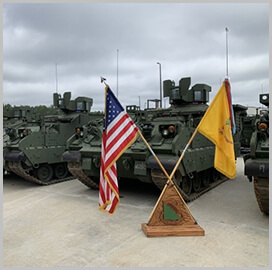The U.S. Army has provided new ground combat vehicles built by BAE Systems to the 1st Armored Brigade Combat Team of the 3rd Infantry Division.
Soldiers at Fort Stewart in Georgia accepted the initial Armored Multi-Purpose Vehicle deliveries as part of the branch’s initiative to replace aging M113 armored personnel carriers, the service said Tuesday.
BAE developed the AMPV platform as part of a $1.2 billion contract awarded in December 2014.
The acquisition program is currently in low-rate production of five vehicle models intended for general purpose, medical evacuation, medical treatment, mission command and mortar carrier operations.
AMPVs are equipped with a powertrain and suspension package similar to the M2 Bradley infantry fighting vehicle and M109A7 Paladin self-propelled howitzer systems.
The Army expects to receive approximately 3,000 new vehicles within the next two decades.





